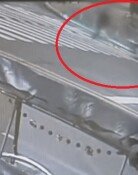Role to overcome adverse external economic conditions
Role to overcome adverse external economic conditions
Posted December. 16, 2015 07:44,
The Chinese yuan has weakened to 6.4559 against the U.S. dollar on Tuesday, falling to its lowest level since July 2011, as the Chinese central bank is continuing to let the yuan weaken. This is raising concerns that the global economy will be mired again in a currency war. Worse yet, the U.S. Federal Reserve is likely to hike interest rates on Thursday for the first time since 2006, which, coupled with continued fall in oil prices, could bring a triangle tsunami on the global economy. Amid fast-pacing external conditions, the main opposition party of Korea is dragging down reform law and the government is blaming the National Assembly, raising skepticism on whether Korea could effectively deal with the upcoming potential crisis.
In the run-up to the U.S. rate hike, global financial markets suffered Monday a taper tantrum. Stock markets in Japan, Korea and Indonesia plunged and currency volatility expanded on the day. If the U.S. raises interest rates, there will be a capital outflow rush from emerging markets. Uncertainties are rising of a recurrence of the currency crisis similar to one that originated from Southeast Asia in 1997. The U.S. hiked its interest rates in 1994, which considerably contributed to the breakout of a currency crisis in the region. Luckily, Koreas main stock index KOSPI and tech-heavy KOSDAQ rebounded Tuesday, but external conditions are worse than 20 years ago as emerging market economies including Brazil, Russia and Venezuela have been devastated due to falling commodity prices including oil prices.
Chinas yuan depreciation is augmenting uncertainties. China says Monday it will measure the yuans performance against a currency basket of 13 major currencies, instead of the U.S. dollar. With U.S. rate hike imminent, China is aiming to boost export competitiveness by preventing a simultaneous strengthening of its currency. Yuan depreciation makes Korea in a weaker position in price competitiveness against Chinese products. And if the Korean won moves in sync with the yuan, it will have adverse effects on Koreas stock markets.
At a meeting with senior presidential secretaries on Monday, President Park Geun-hye urged the National Assembly to promptly handle the economic invigoration law, stressing that, If industries in recession due to oversupply dont go through restructuring in advance, a huge crisis will hit them, which will lead to massive layoff. The main opposition party is mired in internal conflicts and has laid aside support of the livelihood of the working people. It is worrisome that they are neglecting issues like the labor reform laws and special law for boosting corporate vitality.
However, the government should not solely blame the parliament. "The government should stop putting up excuses that they cant do work because of noncooperation of the National Assembly," said Lee Han-koo, member of the leading Saenuri Party. The administrative agencies should still do things they can. Leading nations including the U.S., European countries and Japan are all committing themselves in a way that is beneficial for them, but Koreas political leadership is mired in blaming others. Ultimately, the government has the responsibility to overcome economic difficulty.







